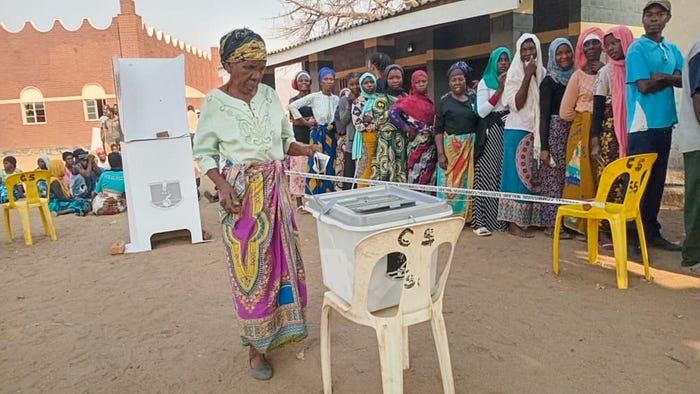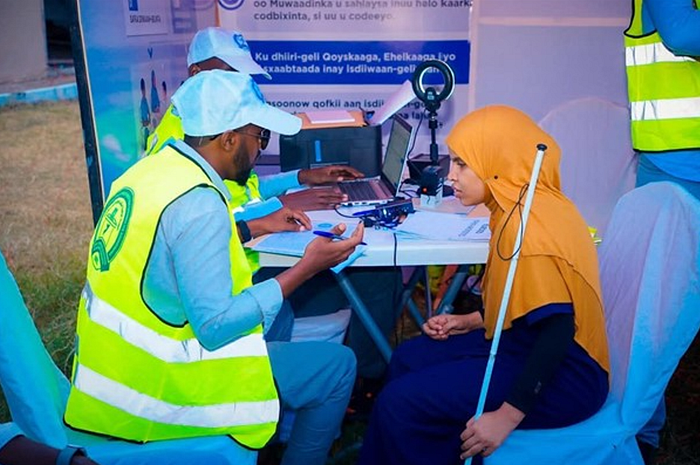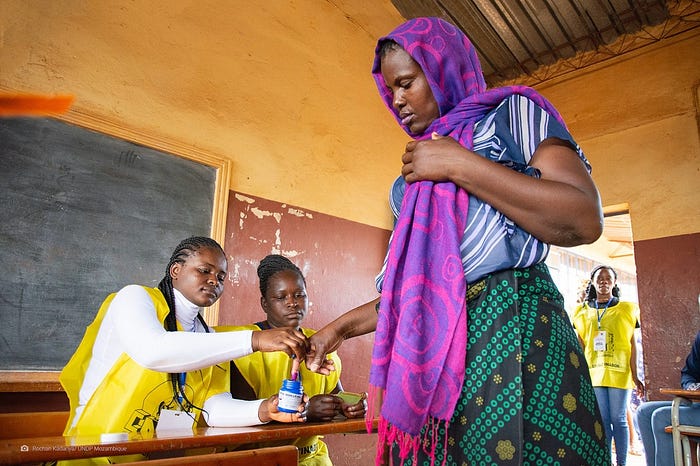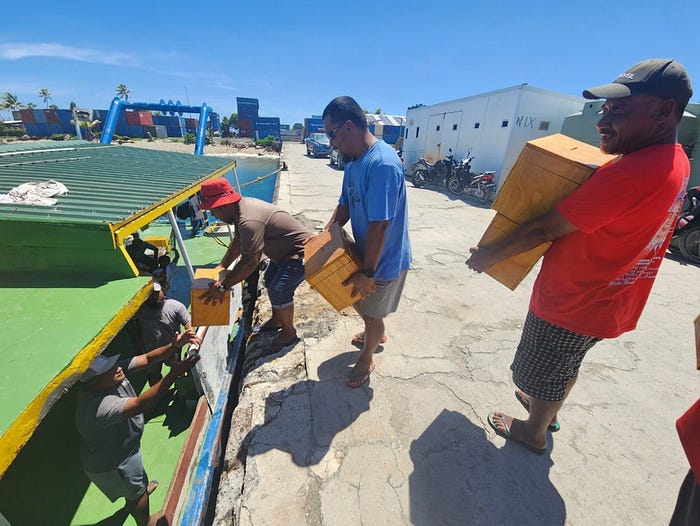As Syria’s humanitarian needs soar and aid funding dries up, UN officials urged the Security Council on Wednesday to step up support, warning that millions face continuing hardship even as the country rebuilds its political institutions.
As Syria’s humanitarian needs soar and aid funding dries up, UN officials urged the Security Council on Wednesday to step up support, warning that millions face continuing hardship even as the country rebuilds its political institutions.

In Buluma Village, Malawi, Patuma, 82, woke at 4 a.m. to make her way to the Changamire Polling Centre to cast her vote in the country’s recent general elections. She hoped to elect a candidate who could bring down the price of fertilizer — a vital need for her family.
Across the globe, people head annually in great numbers to the ballot box — from remote villages to urban centres, from first-time voters to elders like Patuma. Each vote cast is a personal act of hope, trust and political participation — a symbolic yet tangible moment in democratic processes. Elections are among the largest peacetime mobilization efforts any country undergoes. They are also the moment when each individual citizen gets a meaningful say in the decisions that shape their lives.
In any given year close to one hundred countries might hold elections. Behind a number of these elections is the support of the United Nations. Working alongside national institutions and local partners, the UN system helps foster electoral processes that are peaceful, inclusive and credible — and has done so in over one hundred countries worldwide. At any given moment, more than 40 countries receive UN support — always at the request of the Member State or by mandate, and under national ownership. Most support is technical: strengthening electoral bodies, improving laws, furthering inclusion and providing operational assistance to ensure that every eligible citizen can take part.

In Malawi, where voters like Patuma took part in the recent general elections, the UN supported national efforts to strengthen electoral institutions, promote participation and help ensure that citizens had access to information.
But Malawi is just one example.
In Liberia, the UN helped reinforce electoral institutions. In Vanuatu, it assisted with organizing elections after a major earthquake. In Ecuador, the UN supported efforts to strengthen information integrity and civic engagement.
Support in each country looks different. In some contexts — such as the Central African Republic or Libya — assistance is multidimensional, part of UN peacekeeping or special political missions. In others, like Armenia, Panama or Timor-Leste, support has been more targeted. In every case, the approach is guided by national priorities and adapted to local contexts.
In countries without a UN peacekeeping or special political mission, UNDP plays a leading role as the UN system’s main provider of support — while also contributing to efforts in mission settings — helping strengthen institutions, sustain national capacities and forge partnerships.
As part of its support, the UN also works to make elections more inclusive — helping ensure that women, youth, persons with disabilities and other groups can take part in shaping their country’s political future.

Around the world, women continue to face barriers to participation in elections — from discriminatory laws to online harassment. UN electoral assistance places inclusion at the centre of its work, helping ensure that women not only vote, but can also stand as candidates, lead electoral bodies and shape their communities’ futures.
In Jordan, the UN supported efforts to make elections more accessible for women and persons with disabilities. In the Democratic Republic of the Congo, Sierra Leone, Liberia and Mozambique, hundreds of women benefited from UN-supported training and outreach initiatives. Through partnerships with regional organizations, the UN has helped bring together women electoral officials and supported training on women’s leadership and inclusion.
These efforts continue to reflect a simple but powerful idea: every voice — including women’s — should be heard and recognized.
As the Organization marks its 80th anniversary, demand for UN electoral assistance shows no sign of slowing. In the past two years alone, 43 Member States have formally requested electoral assistance — including several for the first time — a clear sign of continuing trust in the UN’s role and expertise.
The Secretary-General’s latest report on electoral assistance (A/80/277) takes stock of UN support over the last two years, noting that during this period 58 Member States and territories received some form of UN electoral support. That demand also reflects a broader recognition that credible elections require constant attention and commitment.
At the same time, the report notes that declining funding — particularly in non-mission settings — risks limiting the UN’s ability to respond. It underscores that UN electoral assistance remains a cost-effective investment in good governance and conflict prevention.
Echoing the Secretary-General’s message in her recent presentation of the report to the Third Committee, Assistant Secretary-General for Africa Martha Ama A. Pobee said:
“Genuine elections that reflect the will of the people are not guaranteed. Gains can be reversed. Sustained commitment and investment are essential to ensure inclusion, protect electoral integrity and maintain public trust.”

Behind every election supported by the UN is a network of people — staff, experts, volunteers — who work with quiet dedication. Some work with national election commissions to train officials or support voter education; others help procure materials or move them across difficult terrain. Still others focus on fostering inclusion and helping enable a peaceful electoral environment.
This work is led and coordinated by the Under-Secretary-General for Political and Peacebuilding Affairs (DPPA), the UN’s focal point for electoral assistance, supported by the Department’s Electoral Assistance Division. Across these system-wide efforts, DPPA, the Department of Peace Operations, UNDP, UN Women, OHCHR, UNOPS, UNESCO, UNV and others each contribute according to their mandates and areas of expertise. Together, these efforts give tangible meaning to the UN’s commitment to support Member States at their request.
From young voters to displaced communities, from national commissions to civil society, the UN continues to support elections — one vote, and millions of voices at a time. For voters like Patuma, the simple act of marking a ballot is a reminder that every vote counts.
Women and girls in the Democratic Republic of the Congo (DRC) are trapped in one of the world’s worst humanitarian crises and face rampant insecurity, a senior United Nations official warned on Tuesday following a visit to the country.
More than a million people have returned to Sudan’s war-ravaged capital in the past ten months, the UN migration agency said on Tuesday, warning that basic services remain shattered amid continuing disease outbreaks.
The UN human rights office (OHCHR) in the Occupied Palestinian Territory has warned of an alarming rise in violence and restrictions by Israeli settlers and security forces against Palestinian farmers, as the crucial olive harvest season gets underway.
In Gaza, the ceasefire is enabling UN humanitarians to reach more desperate people with life-saving food – but greater access is needed to contain the spread of famine.
To Sudan, where the people of government held El Fasher in the west of the war-torn country remain trapped without food, water or medical care, UN aid coordinators, OCHA, said on Monday.
The UN on Monday said it was encouraged by renewed Gaza ceasefire commitments, warning that recent violence risked undermining fragile progress, as recovery efforts – including a large-scale rubble removal project – slowly gain momentum across the war-ravaged enclave.
Around 676 million women lived within 50 kilometres of deadly conflict last year – the highest figure since the 1990s.
|
|
|
|
|
|
|
|
|
|
|
|
|
|
|
|
|
|
|
Up to 500,000 illegal weapons ranging from handguns to battlefield-grade semi-automatic rifles are thought to be in the hands of gangs in Haiti, even though the Caribbean country has been under a UN arms embargo for the last three years.
The Security Council on Friday welcomed Lebanese Government efforts to exercise full national sovereignty through the Lebanese Armed Forces (LAF), as the UN warned that peacekeepers are continuing to find unauthorised weapons caches in the south.
The UN Security Council unanimously adopted a resolution on Friday that renews sanctions in Haiti for another year as armed gangs continue to terrorize the population.
As the disarmament team approached, combatants from the Retour, Réclamation et Réhabilitation (3R) armed group stood in two orderly lines expectantly, youthful faces and greying heads alike.
The United Nations called on Thursday for Afghanistan and Pakistan to permanently end recent deadly hostilities and protect civilians.
As a fragile ceasefire holds in the Gaza Strip, UN aid teams are intensifying efforts to deliver urgently needed assistance.
A severe funding shortfall is threatening to cripple UN peacekeeping operations worldwide, with the Organization warning that it will have to scale back patrols, close field offices and repatriate thousands of ‘blue helmets’ due to delayed payments from Member States.
The UN has condemned Madagascar’s military takeover, calling for the immediate restoration of constitutional order following last week’s ouster of President Andry Rajoelina.
The UN relief chief on Wednesday urged Israel and Hamas to honour their agreement to return deceased hostages and allow aid at scale into Gaza, warning that it should not be used as “a bargaining chip” amid reports of new civilian killings and extrajudicial executions.
Israel announced late on Tuesday that it will limit the flow of aid to Gaza, accusing Hamas of breaching the ceasefire agreement by returning only four of the bodies of deceased hostages so far.
The UN’s top envoy for Libya warned on Tuesday that the country’s long-delayed political transition will stay on hold unless rival institutions swiftly resolve differences over election laws and key appointments.
Russian drones hit a “clearly marked” UN convoy on Tuesday which was bringing desperately needed aid to a war-torn frontline town in southern Ukraine.
Around $70 billion will be needed to reconstruct Gaza and make it safe after two years of war, UN development experts said on Tuesday, while aid agencies reported that far too little aid is getting in to meet the needs of desperate Palestinians.
The UN is stepping up its emergency response in Gaza, releasing $11 million from its Central Emergency Response Fund (CERF) to meet urgent needs before winter – a move that underscores both the expanding humanitarian effort and the funding shortfall threatening to stall it.
As the humanitarian crisis continues to escalate in Haiti, the World Food Programme (WFP) warned on Monday that women, children and displaced families are disproportionately affected as malnutrition and hunger rise.
Ramallah, in the Occupied Palestinian Territory of the West Bank, is a bustling urban centre, but it is ringed by barriers and checkpoints which dominate every aspect of life. Speaking at the UN Forum of Mayors in Geneva, Issa Kassis, the mayor of Ramallah, says that the challenges faced by city leaders are amplified by conflict and occupation.
There is now “real hope” for a ceasefire which would pave the way for a lasting and definitive settlement of the conflict in the eastern Democratic Republic of the Congo (DRC), the UN Special Envoy for the Great Lakes Region of Africa, Huang Xia, told the Security Council on Monday.
As the UN Secretary-General on Monday welcomed the release of all living hostages from Gaza, aid agencies said that lifesaving relief supplies are now flowing at scale into the shattered enclave.
At least 17 children, including an infant just seven days old, have reportedly been killed in an attack on the Dar al-Arqam Displacement Centre in El Fasher, North Darfur, early on Saturday morning.
Thank you, Mr. President, Excellencies,
In mid-August, an increased United States military presence was reported in the Southern Caribbean, off the coast of Venezuela. According to United States authorities, these deployments are part of their efforts “to stop drugs from flooding into the United States and to bring those responsible to justice”.
This military presence has heightened ongoing tensions between the two countries.
On 29 August, the Permanent Representative of the Bolivarian Republic of Venezuela met with the Secretary-General to share his Government’s concerns over the deployment, which were later echoed by the Foreign Minister in a September meeting.
Tensions further increased when, on 2 September, the United States government announced that its military had struck a vessel suspected of carrying illegal drugs in international waters in the Southern Caribbean Sea. According to United States authorities, eleven individuals were reportedly killed in this attack.
Based on information released by United States authorities, additional air strikes on vessels allegedly carrying drugs were conducted on 15, 16, and 19 September, and again on 3 October.
In total, these operations reportedly resulted in 21 fatalities. The exact locations of these incidents have not been disclosed.
The United Nations is not in a position to verify these reports.
Mr. President,
On 2 October a White House spokesperson said that "the President acted in line with the law of armed conflict", seeking to protect the US "from those trying to bring deadly poison" to its shores, in line with the President's "promise to take on the cartels and eliminate these national security threats from murdering more Americans."
Mr. President,
Venezuelan authorities have announced that they remain on high alert since the United States military deployments were first reported in August. They have also publicly stated that Venezuela does not wish to engage in warfare but continues to prepare to defend its sovereignty.
On 18 August, President Nicolas Maduro announced the mobilization of 4.5 million members of the Bolivarian Militia—a civilian force with military training—to support the armed forces.
Venezuelan authorities have also announced military exercises along the country’s coasts, including the mobilization of warships, aircrafts and drones “to strengthen defense and sovereignty”.
On 4 September, according to the U.S. Government, two Venezuelan military aircrafts flew over a U.S. Navy vessel in international waters—a move the United States described as “highly provocative.”
On 13 September, Venezuelan authorities also denounced that a United States vessel detained a fishing boat sailing in Venezuelan waters for eight hours.
On 29 September, President Maduro signed a State of Emergency decree, granting the presidency expanded security powers in case of external aggression. The details of the decree remain undisclosed.
Venezuelan authorities stated on 2 October that they had identified five U.S. fighter jets flying 75 kilometers away from their shores, denouncing the flights as a "provocation," a "threat to national security”, and “a threat to the safety of civil aviation”.
Venezuelan authorities have strongly condemned the strikes, which President Maduro described as a “violation of international law”, and have called for international investigations. The Permanent Representative of Venezuela, in a letter to the Security Council dated 9 October further stated that the “ulterior purpose” of the US actions continues to be to “advance its policies of regime change”.
Mr. President,
Since 21 August, the Secretary-General, through his Spokesperson, has urged both parties to de-escalate tensions, exercise restraint, and solve their differences through peaceful means.
The Secretary-General has emphasized that it is imperative for Member States to ensure that their actions to combat drug trafficking are carried out in accordance with international law, including the UN Charter.
The Secretary-General has also acknowledged the challenges posed by transnational organized crime to Member States. He has called for close cooperation and constructive dialogue to ensure that efforts to address these threats uphold the rule of law and respect human rights.
The United Nations High Commissioner for Human Rights, through his Spokesperson, has also stressed that “The use of force in countering illicit trafficking is, in principle, a law enforcement matter and any such use of force must respect human rights law and standards, including the Basic Principles on the use of force by law enforcement officials”.
Mr. President,
The United Nations recognizes the devastating impact of violence driven by transnational organized crime, which affects production, transit, and destination countries alike, tearing at the fabric of communities and undermining development and stability across the region.
We continue to emphasize the need for all efforts to counter transnational organized crime to be conducted in accordance with international law, including the UN Charter.
Finally, we reiterate the call for de-escalation and continue to urge the parties to avoid any actions that may threaten international peace and security in the region. We call for a constructive dialogue and a peaceful resolution of differences.
The United Nations remains available to support any efforts in this regard.
I thank you, Mr. President.
|
|
|
|
|
|
|
|
|
|
|
|
Mr. President,
Excellencies,
Ladies and gentlemen.
Thank you for the opportunity to brief the Security Council on the cooperation between the African Union and the United Nations. Special Representative Parfait Onanga-Anyanga has provided you with an update on the main developments related to this strategic partnership. Commissioner Bankole / Permanent Observer Mohamed Edrees will brief you on the African Union’s perspective on the matter. I will provide this Council with a brief progress update on the implementation of resolution 2719 (2023).
This year marks the 80th anniversary of the founding of the United Nations. African membership has grown from just four member states in 1945 to some 54 today, constituting more than a quarter of the membership. The significance of this is also reflected in the partnership between the United Nations and the African Union, which has never been stronger. We welcome, in this regard, the adoption of resolution 79/329 by the General Assembly on cooperation between the two organizations.
As this Council is aware, armed conflicts have been resurgent globally, including in Africa. Conflicts have also grown in complexity. Resolution 2719 was, therefore, conceived as a means to address a longstanding gap in the African Union’s peace and security architecture to better to respond to armed conflicts on the African continent, with the support of the broader international community, and this Council in particular. In this regard, we are encouraged that since its adoption in 2023, the Council has repeatedly reiterated its support for the implementation of the resolution on a case by case basis, including in the letter from the President of the Security Council to the Secretary-General dated 3 May 2025 (S/2025/322)
Mr. President,
Resolution 2719 sets out clear directives across four priority workstreams, as reflected in the Joint Roadmap for the operationalization of resolution 2719, which was endorsed by the Secretary-General and the Chairperson of the African Union Commission in October 2024. Since then, we — the African Union Commission and the United Nations Secretariat — have made progress, drawing on lessons from previous African Union–led and United Nations operations, and our ongoing collaboration. Let me outline the areas of progress on these four priority workstreams:
Joint planning, reporting, decision making: We have developed joint planning modalities for establishing new African Union–led peace support operations under the framework of resolution 2719. These planning modalities were approved at the Twenty-Fifth Consultative Meeting of the United Nations–African Union Joint Task Force on Peace and Security on 27 September. The modalities provide for a predictable, coherent and shared planning and decision-making architecture, serving as a common reference for possible future cases.
Mission support. Effective operational support will equally be critical for translating political mandates by the Security Council and the African Union Peace and Security Council into operational reality, and for sustaining efficiency in the field. Accordingly, we have developed joint support planning modalities too. They foster synergies and complementarity in the delivery of operational support to African Union-led operations. This guidance document, also approved by the Joint Task Force on Peace and Security on 27 September, will be validated through a joint exercise.
Financing and budgeting. In May, the Secretary-General submitted a report detailing how the United Nations Financial Rules and Regulations would apply should the Security Council decide to authorize an African Union-led peace support operation under the framework of resolution 2719, using the support office model. The report sets out standards for oversight, accountability and budgetary processes, and provides a framework for the preparation and implementation of financial arrangements. Its application will be tailored to the specific African Union–led peace support operation authorized by the Council. The Secretary-General’s report is currently under review by the relevant United Nations legislative bodies.
Compliance and protection of civilians. A robust Human Rights Due Diligence Policy mechanism, and a strengthened African Union Compliance and Accountability Framework are essential for the full implementation of resolution 2719. The implementation of the AU Compliance and Accountability Framework is advancing through the development of processes, policies and structures for African Union-led operations. For instance, the adoption of a draft African Union policy on gender integration in peace support operations is pending, alongside the development of a gender-responsive monitoring and evaluation curriculum, amongst others.
The modalities developed across the four workstreams represent a concrete step in the operationalization of resolution 2719. They seek to ensure that our collaboration is grounded both in strategic vision and in operational practicality.
A report on the overall implementation of resolution 2719 will be submitted at the end of the year, providing a detailed account of the work done.
Mr. President,
As we reflect on the future of peace operations and seek efficiencies, it becomes even more evident that resolution 2719 meets the moment. The resolution contributes to making peace operations relevant to contemporary challenges. It seeks to ensure that we leverage our respective advantages in keeping with the Pact of the Future, the New Agenda for Peace, and Silencing the Guns initiative. The synergy it offers can also help generate cost-efficiencies.
While significant progress is being made, there are still challenges ahead. Indeed, amongst others, the United Nations and the African Union must keep working on fostering a shared understanding of and expectations on the resolution, including with the African Regional Economic Communities, Regional Mechanisms and other key stakeholders. Shared understanding and realistic expectations are key to successful partnerships, given the variety of the mandates and memberships of the various multilateral organizations involved. In this regard, The Secretariat will continue work on socializing resolution 2719 and its provisions.
Mr. President,
In closing, I would like to reiterate the Secretary-General’s unwavering commitment to work towards the implementation of resolution 2719, to ensure that the African Union, with support from the United Nations, is in the best position to rise to the peace and security challenges of our times.
I thank you, Mr. President.
Millions of Haitians are facing food insecurity as armed groups continue to expand their territorial control around the country, the latest internationally-recognised IPC hunger report found.
At least 214 civilians were killed and almost 1,000 injured in Ukraine last month, the UN Human Rights Monitoring Mission for the country (HRMMU) said on Friday.
The UN on Friday warned of mounting risks to regional peace after a series of US military strikes on boats it accused of drug trafficking left at least 21 dead in the southern Caribbean, prompting Venezuela to declare a state of emergency and denounce the attacks as a breach of international law.